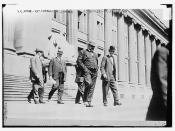"Now you know! That's what it was to be alive. To move about in a cloud of ignorance; to go up and down trampling on the feelings of those...of those about you. To spend and waste time as though you had a million years. To be always at the mercy of one self-centred passion, or another. Now you know - that's the happy existence you wanted to go back to. Ignorance and blindness."
The characters in Wilder's Our Town indeed 'spend and waste time as though [they] had a million years.' The people of Grover's Corners lead predictable, routine lives. This is emphasised in the text with the Stage Manager's constant references to daily routines such as the paper and milk deliveries, sunrise and sunset, and the first train of the morning. The fact that these everyday events appear, without much change, throughout the course of a play which spans thirteen years implies that it is doubtful that the predictability and simplistic nature of the town will ever change.
Much of the townspeople's conversation is also limited to small-minded gossip or idle talk about the weather, as we see in Mrs. Gibbs and Howie's conversation (************QUOTE PAGE 26***********). Both of these references suggest that the day-in-day-out nature of their lives means that they do little to cherish life when they still have it, as Emily discovers in Act Three.
Simon Stimson comments that people 'move about in a cloud of ignorance...always at the mercy of one self-centred passion or another.' (Wilder: p89). This is evident in Act One of Our Town when a man asks Mr. Webb if anyone in the town is "aware of social injustice and industrial inequality." (Wilder: p35) Mr. Webb assures him they are, and the man demands to know why nothing is done about it.


